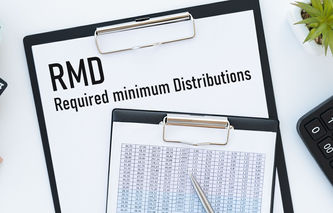Funding a retirement account is an important part of the financial planning process. When it comes to choosing between a Traditional and a Roth IRA, it's important to make an informed decision, since it's vital to get the optimal future income benefit from the money placed into either of these plans.
Traditional or Roth IRA
While many investors have completely switched, a Roth IRA isn't the right choice for everyone. In fact, there are some significant advantages that a Traditional IRA offers versus the Roth. At last count, we've found seven major differences between these two IRAs, which are summarized in the table below and explained in the following paragraphs.
Traditional IRA | Roth IRA | |
Age Limit for Contributions | Yes | No |
Income Contribution Limits | No | Yes |
Tax Deductions | Yes (Note 1) | No |
Mandatory Distributions | Yes | No |
Taxing of Distributions | Yes (Note 2) | No |
IRS Form 8606 (Contributions) | Yes (Note 3) | No |
IRS Form 8606 (Withdrawals) | No (Note 3) | Yes (Note 3) |
Note 1: eligibility rules apply to deductibility.
Note 2: applies to the tax-deferred portion of the account.
Note 3: applies to all tax-deferred portions of these accounts.
Age Limit for Contributions
Traditional IRA: individuals reaching age 70 1/2 in a given calendar year, can no longer contribute to a Traditional IRA.
Roth IRA: Individuals can contribute to a Roth IRA at any age.
Income Contribution Limits
Traditional IRA: while there are limits on how much an individual can contribute, there is no income threshold that determines eligibility to contribute.
Roth IRA: depending on the tax filing status, individuals earning too much money, may not be eligible to contribute.
Deductions from Federal Taxes
Traditional IRA: there is a good possibility that deposits are tax deductible. There are certain eligibility rules that depend on income, tax filing status, receipt of Social Security benefits, or if a retirement account is offered at work.
Roth IRA: tax deductions are not allowed with these plans.
Mandatory Distributions
Traditional IRA: there are required minimum distributionsstarting at age 70 1/2.
Roth IRA: owners are never forced to take a distribution from their account.
Taxing of Distributions
Traditional IRA: the tax-deferred portion of a distribution is taxed just like ordinary income.
Roth IRA: in general, federal income taxes are not due on distributions.
IRS Forms for Contributions and Withdrawals
We mentioned that there are a total of seven differences, but we've only explained five so far. That's because the final two differences have to do with filing paperwork with the IRS.
Individuals making a non-deductible contribution to a Traditional IRA need to file Form 8606. Since Roth IRAs are always non-deductible, taxpayers never have to fill out a Form 8606 when making a contribution to their account.
When making a withdrawal, or taking a distribution from a Roth IRA, filing Form 8606 is required. Filing Form 8606 is only required for non-deductible contributions made to a Traditional IRA.
Choosing Between a Roth and Traditional IRA
The above information should help taxpayers make a more informed choice when deciding between a Roth and Traditional IRA. We've described seven differences between these two plans, and the outcome is pretty evenly divided between the two.
The choice is clearly a personal one, and depends on several factors such as income levels and age. Individuals that wish to quantify some of the financial differences between these two accounts can try our Roth vs. Traditional Funds Calculator.




